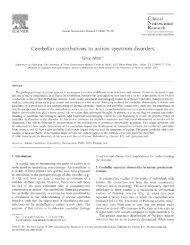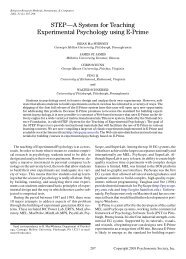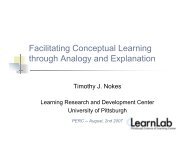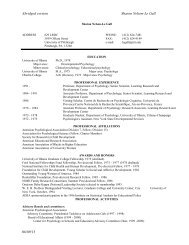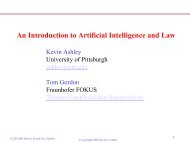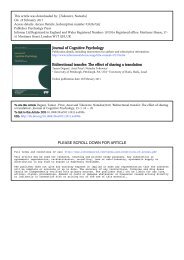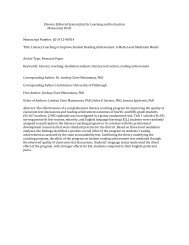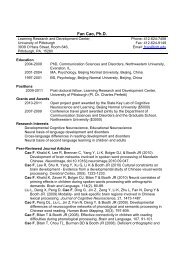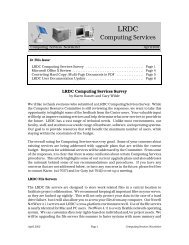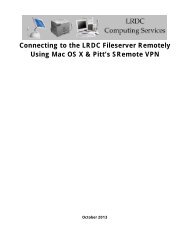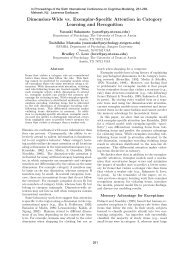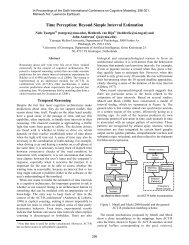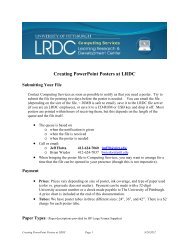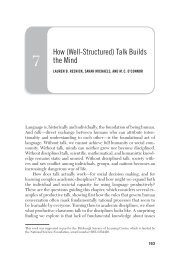Nested Learning Systems for the Thinking Curriculum
Nested Learning Systems for the Thinking Curriculum
Nested Learning Systems for the Thinking Curriculum
Create successful ePaper yourself
Turn your PDF publications into a flip-book with our unique Google optimized e-Paper software.
Resnick, L. B., & Spillane, J. P. (2006). From individual learning toorganizational designs <strong>for</strong> learning. In L. Verschaffel, F. Dochy,M. Boekaerts, & S. Vosniadou (Eds.), Instructional psychology: Past,present and future trends. Sixteen essays in honor of Erik De Corte(pp. 259–276). Ox<strong>for</strong>d, UK: Pergamon.Resnick, L. B., Spillane, J., Goldman, P., & Rangel, E. (in press).Implementing innovation: From visionary models to everyday practice.In D. Istance, F. Benavides, & H. Dumont (Eds.), Innovativelearning environments. Paris: Organisation <strong>for</strong> Economic Co-operationand Development.Resnick, L. B., Wiliam, D., Apodaca, R., & Rangel, E. (in press). Therelationship between assessment and <strong>the</strong> organization and practice ofteaching. In B. McGraw, P. Peterson, & E. Baker (Eds.), Internationalencyclopedia of education (3rd ed.). London: Elsevier.Rowan, B., & Correnti, R. (2009). Studying reading instruction withteacher logs: Lessons from a study of instructional improvement.Educational Researcher, 38, 120–131.Sahney, V. K. (1993). Evolution of hospital industrial engineering: fromscientific management to total quality management. Journal of <strong>the</strong>Society of Health <strong>Systems</strong>, 4(1), 3–17.Shepard, L. (2002–2003, Winter). The hazards of high stakes testing.Issues in Science and Technology, pp. 53–58.Sherer, J., & Spillane, J. (in press.) Constancy and change in workpractice in schools: The role of organizational routines. TeachersCollege Record.Shulman, L. S. (1987). Knowledge and teaching: Foundations of <strong>the</strong>new re<strong>for</strong>m. Harvard Educational Review, 57(1), 1–22.Slavin, R. E. (1996). Research on cooperative learning and achievement:What we know, what we need to know. Contemporary EducationalPsychology, 21, 43–69.Spillane, J. P., Mesler, L., Sherer, J. Z., & Croegaert, C. (2010). Organizationalroutines as recoupling mechanisms: Policy, school administration,and <strong>the</strong> technical core. Manuscript submitted <strong>for</strong> publication.Stigler, J., & Hiebert, J. (1999). The teaching gap: Best ideas from <strong>the</strong>world’s teachers <strong>for</strong> improving education in <strong>the</strong> classroom. New York:Free Press.Suchman, L. (1996). Constituting shared workspaces. In. Y. Engeström& D. Middleton (Eds.), Cognition and communication at work(pp. 35–60). Cambridge, UK: Cambridge University Press.Talbert, J. E., David, J. L., with Lin, W. (2008, September). Evaluationof <strong>the</strong> Disciplinary Literacy-Professional <strong>Learning</strong> Community (DL-PLC)Initiative in Austin Independent School District. Final Report. Palo Alto,CA: Center <strong>for</strong> Research on <strong>the</strong> Content of Teaching, Stan<strong>for</strong>dUniversity.Thorndike, E. L. (1932). Fundamentals of learning. New York: TeachersCollege, Columbia University.Turner, W. C., Mize, J. H., Case, K. E., & Nazemetz, J. W. (1992).Introduction to industrial and systems engineering (3rd ed.). UpperSaddle River, NJ: Prentice Hall.Tyack, D. B. (1974). The one best system: A history of American urbaneducation. Cambridge, MA: Harvard University Press.AUTHORLAUREN B. RESNICK is Distinguished University Professor ofPsychology and Cognitive Science and of <strong>Learning</strong> Sciences andEducation Policy, <strong>for</strong>mer director of <strong>the</strong> <strong>Learning</strong> Research andDevelopment Center, and founder and director of <strong>the</strong> Institute <strong>for</strong><strong>Learning</strong> at <strong>the</strong> University of Pittsburgh, <strong>Learning</strong> Research andDevelopment Center, 3939 O’Hara Street, Pittsburgh, PA 15260;resnick@pitt.edu. Her current research focuses on school re<strong>for</strong>m, assessment,ef<strong>for</strong>t-based education, <strong>the</strong> nature and development of thinkingabilities, and <strong>the</strong> role of talk and discourse in learning.Manuscript received January 10, 2010Revision received January 15, 2010Accepted January 25, 2010Downloaded from http://er.aera.net at UNIV OF PITTSBURGH on March 30, 2012april 2010 197



